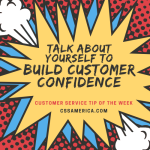Mr. Floyd had always been an effective program manager in his local county government. However, as the financial stresses and strains resulting from the poor economy started to hit his area, he was being pushed harder and harder and harder to improve productivity and better manage costs. Even though these performance areas were expected to be addressed in a positive way, the expectation was that customer satisfaction would not deteriorate.
So Mr. Floyd had to look at his metrics, and figure out new ways to do things. He was being forced to look at data he had never been too concerned with before, including call center performance, average handle time, abandoned call rates, and customer wait times. When he looked at this data, the performance looked like it had not gotten much better or worse over time. He felt good about it. That was before his heart-to-heart talk with his boss.
Mr. Floyd’s new boss felt that although these statistics looked good to Mr. Floyd and had not deteriorated over time, his boss’ question was what is the level of performance that should be achieved? In other words, what is the goal? Mr. Floyd determined that continuing the current performance in the future would be a great goal, but his boss disagreed. His boss said that the goal should be based on what the customer wants and expects. In private industry, the customer expects the call be picked up in 60 seconds, or they’ll abandon the call. In private industry, therefore, the companies expect a 2 to 4% abandon call rate. So regardless of past performance in Mr. Floyd’s department, future performance metrics will be based on customer expectations.
Mr. Floyd made a common error that people in many industries make every year. They focus more on performance trends than on setting goals that drive you towards best practice performance. When you’re setting those performance goals, don’t set them purely based on how you performed historically. Don’t base them on other entities exactly like you — in Mr. Floyd’s case, this would be other County municipal departments which are just like his department. Instead, base your goals on the best.
Maybe he should have step goals that will lead to the best practice level performance, but he needs to know best practice if he wants to continuously improve and — someday — be the best.
Look outside your business, outside your industry to identify what is best. Then start moving in that direction.
Interested in improving your company’s customer service? See more information at: http://www.cssamerica.com/





















